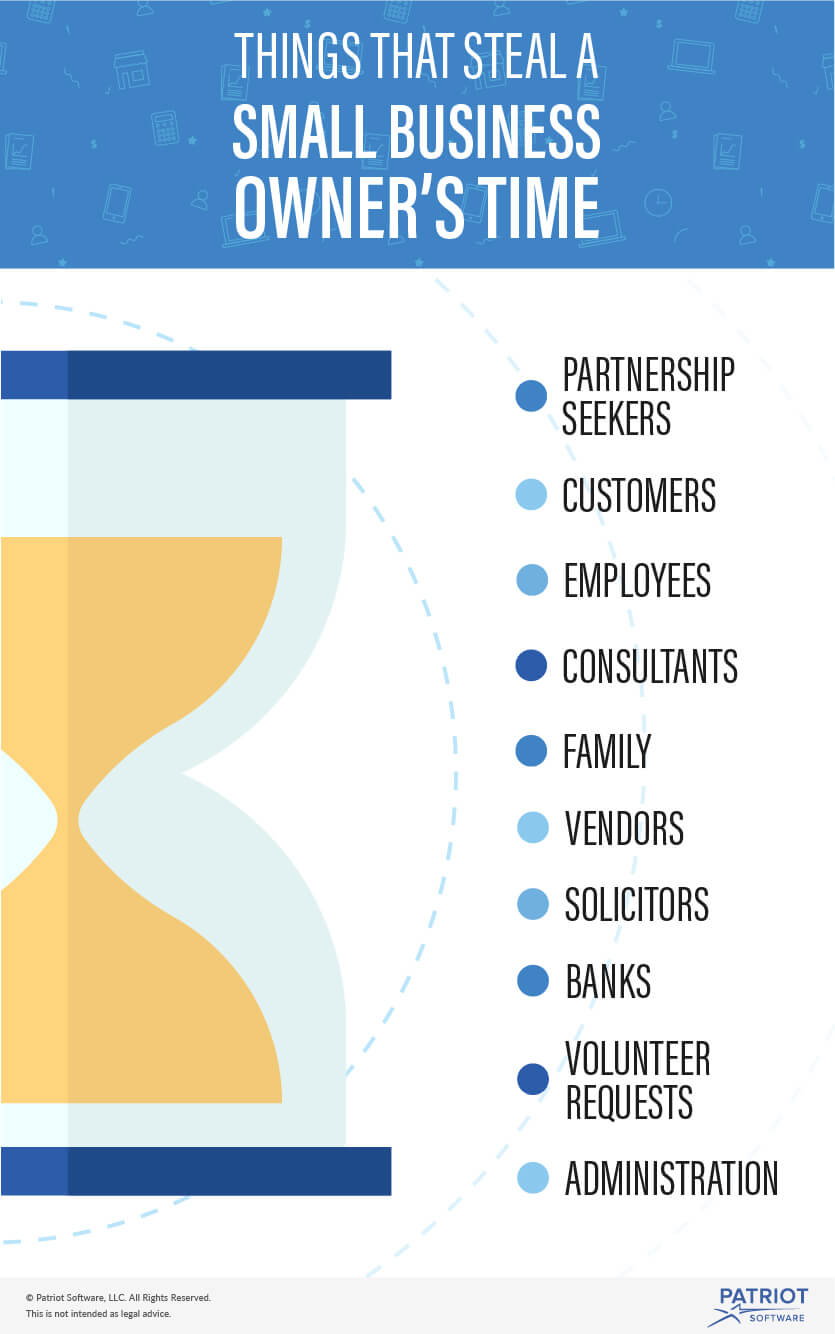This column was originally published on Entrepreneur.com on 4/4/2016.
As an entrepreneur, the most valuable asset you have is your time. You’ll rarely have enough time to do what you need, and virtually never enough time to do what you want.
The general assumption is, since time is free, you’ll simply spend as much time as is required to complete the business at hand. An entrepreneur might mistake time for some type of hard work multiplier, but it’s more than that. Time is a currency, and you have a limited supply of it.
Cash is the lifeblood of your business — there is no denying that. If you don’t have enough cash, your business will cease to exist. However, you can make (or lose) a lot of cash in an hour. An hour, on the other hand, will always be an hour, and you’ll only get so many in a day no matter how successful you become. In order to spend your time wisely, let’s identify the ten most common things vying for it.
Vendors
My companies buy from a variety of vendors and suppliers. Forming a relationship with a vendor can be useful, but you’ll want to spend as little time with them as you can. Vendor time should be spent conducting a business transaction. If you know what you want, you should be able to—quickly and cordially—acquire it. If you don’t, you’re a prime target for an upsell. Come into these conversations prepared or you’ll get sucked into a time-wasting black hole.
Solicitors
Like all business people, I receive unsolicited phone calls, emails, social media messages, etc., from people seeking to sell me something. When I started out, I used to return their emails with a “no thank you message” because I thought it was the polite thing to do. Now I’ve stopped doing that because I receive too many — I no longer reply a all. That may seem rude, but I didn’t ask them to solicit me in the first place.
Banks
If you’re putting money in, banks are the best. If you’re asking for money, they can be a major time suck.
Fortunately, you can circumvent a lot of the hassle banks present by knowing the language that banks speak. If you’re heading to a bank for loan for your small business, they’ll want to know what your financial situation is, what your business plan is, and see all the documents that support your projections.
You’ll want to provide them with as much information as you can, and speak as insightfully as possible. Banks can be intimidating, but for many entrepreneurs, they’re a necessary evil early on. You’ll waste less time if you prepare to encounter them on their terms.
Volunteer requests
I believe that all of us have different callings in our lives. My calling is to be a “giver.” That is, I’m called to be an entrepreneur who (1) makes money, and (2) “gives” a lot of that money away. I give to specific faith-based charities that my wife and I find, research, and agree upon. I do not feel that I have a calling on my life to be a giver of time. So I almost always say “no” to requests asking me to volunteer my time. Instead I spend my time with my family and performing my entrepreneurial duties.
Your calling regarding charitable giving may absolutely be different, and that’s fine. However, if you’ve not come to the realization of how valuable your time is, you can easily spend more time than money.
Partnership seekers
As your business becomes more well known, more companies will want to partner with you. They’ll offer complimentary services or leads or something they feel is mutually beneficial, and profitable. Frequently it will come down to this: they want to sell their wares to your customers in exchange for you selling yours to theirs.
Although I may be missing out, I almost never partner with other companies unless there is a clear return on investment, or it allows me to save a significant amount of time. I’ve learned to stay out of “Hey Mike, let’s work together” arrangements. I always try to be polite to people seeking to partner with me/us because they’re typically high-quality companies, but if it’s not beneficial, there’s no reason to explore the possibility. I prefer to keep our focus on solving specific needs for our customers instead of pitching someone else’s offering at them – which can be a poor use of my time.
Customers
Yes, customers can consume your time. Ironic, since having lots of customers means that you are, by default, spending lots of time with them.
I gladly spend time listening to my customers, but I’m careful not to linger and socialize more than I need to. My customers are filled with wisdom, and through listening to them, I learn how to satisfy their needs. However, once I know how to satisfy those needs, I must move on to my next customer’s needs.
Just because you’re with a customer doesn’t mean your time is well spent. In fact, some business models are built around the amount of time they are able to give to a customer, viewing that time as value-added, and worth an increased fee.

Consultants
Consultants are interesting. Remember what I just said about time as a value-added? Well, nobody knows that better than a consultant. Ironically, you are hiring them because you don’t have the time to specialize in a subject that is crucial to the success of your business. You’re buying their time in order to save your own.
Accountants, insurance agents, and attorneys all know the value of their time and they will bill you accordingly. Therefore, you need to make sure you get the most out of it. Plan what you need from your business consultants and make sure you get the most information for the smallest investment of time (and money).
Employees
My door is always open to any of my co-workers, and I will spend as much time with them as they need, for any reason whatsoever. No questions asked. I need my employees—I can’t run my business without them! However, the more time I spend with a co-worker, the less time I’m an actual worker.
Recruiting, hiring, training, and managing employees takes time. Think about the number of conversations you’ll have. Emails you’ll have to exchange. Meetings you’ll need. Training documents that will be required. Testing, measuring, and performance reviews. All of these are the hidden time costs of expanding your workforce.
A rookie entrepreneur mistake is not understanding how much time it takes to onboard new employees. Even new hires with years of experience need time to learn how you do things, which means you need to be there to teach them, unless you have someone else who can. And, for the record, hiring the wrong employee can be one of the most damaging things you can do your business, so you want to take as much time as necessary to make sure you do it right.
Family
Harsh, I know, but “training” family to leave you alone during working hours is fundamental to entrepreneurial success.
It’s easier said than done, especially since many entrepreneurial ventures start from home. In fact, some business are started precisely because they allow the business owner to spend more time with family.
Regardless, it is important to understand that, in order to maintain any kind of work/life balance, set working hours need to be established. Whether you’re going into an office or working from home, your family should be aware of those times when they need to stay out of your way so you can work.
There will be times when family intrusion into your work will be unavoidable. Kids get sick. Spouses have urgent questions. Pets get loose. Life happens. There will be times you welcome family in, to celebrate birthdays and anniversaries, hold private events, or just because you can—it’s your business after all!
Just remember the line between work and play. Because entrepreneurial work is so closely tied to your personal and family life, you need to be diplomatic about the needs of both. You need your family to support your business if it’s going to have any chance of success, but you must balance that quest for success with the needs of your family.
Administration
By far the biggest time suck you’ll face in business.
Taxes, payroll, recruiting, HR services, emailing, communications, bill-paying, bean-counting… They all eat up time; time you could be spending on building and growing your business.
Administrative duties are the sludge of the business world; they slow everything down. Ever wonder why there is such a boom for business automation tools, like SAP or cloud-based payroll? These services are the sludge remover that allow you to get back more of your time.
Entrepreneurs should strive to make their business operations sludge-free from the start in order to give themselves the best chance of success. Why? Because sludge multiplies. Bad administrative practices can compound and domino onto everything else. They can send you running to expensive consultants, cause you to lose customers, subtract from the time for your family, and get on the wrong side of banks.
A happy business is a nimble, agile, business that runs its administration in a streamlined fashion.
Some of my views might sound a little harsh, but my experience has taught me that if I don’t protect my time, it will be taken from me. I’ve had to make some tough choices, and I’m not suggesting that you imitate everything I’ve done. But, if you take nothing else from this article, let it be that you should view spending your time as though you were spending your money. Time is a currency, invest it wisely



